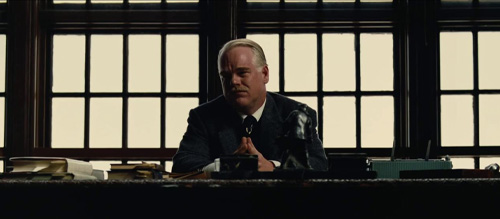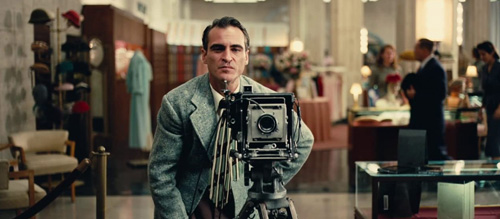‘The Master’ at 10 – Review
The Master (2012)
Director: Paul Thomas Anderson
Screenwriter: Paul Thomas Anderson
Starring: Philip Seymour Hoffman, Joaquin Phoenix, Amy Adams, Jesse Plemons, Price Carson, Bruce Goodchild
Suffering, sexual depravity, dysfunctional non-biological paternalism and a chance meeting that changes everything – Paul Thomas Anderson’s 2012 masterpiece The Master is not without all the signature trimmings we’ve come to know and love from one of American cinema’s most respected 21st century directors. 10 years on and the truths it serves resonate more profoundly than ever. Undeniably, The Master has left a mark on the history of cinema.
Following a stint in the US Navy, Freddie Quell (Joaquin Phoenix), a depraved alcoholic, can’t hold a job or a girlfriend down. Fuelled by his own dangerous concoctions, Freddie stumbles into a yacht where he enters the orbit of charismatic cult leader Lancaster Dodd (Philip Seymour Hoffman). Freddie, vulnerable, sex-hungry and traumatised, is invited to stay with Lancaster and Peggy Dodd (Amy Adams) so that he can join “the Cause”. Freddie hungrily laps up the higher purpose offerings of “the Cause” and quickly becomes the meathead muscle mouthpiece for Lancaster Dodd’s dictum.
Freddie is a man that wants to be dominated – perhaps from his time spent in the Navy – and most certainly displays severe symptoms of Post-traumatic stress disorder (PTSD). Lancaster is a megalomaniac, splaying out tendrils of control across everything he touches. Their relationship becomes symbiotic, mutually poisonous, fired up with oedipal homoeroticism (see lyrics to Depeche Mode’s “Master and Servant”), the pair at once propping each other up and simultaneously dragging each other down. Underpinned by the stunning score written by Radiohead’s Jonny Greenwood and performed by The Aukso Chamber Orchestra, the tension holds throughout and makes for an uneasy watch.
Parallels between Lancaster and Scientology founder L. Ron Hubbard are present throughout but feel peripheral to the central focus of the film. In fact, the actual matters of story and plot serve only to support the infinite moments between the characters. The outstanding performances and carefully crafted characters are what hold this film together, with the main cast scoring a hat-trick of Oscar nominations for their performances. Joaquin Phoenix’s sexually-charged and raw delivery makes for mesmerising viewing, while the late Phillip Seymour Hoffman’s memorable and magnetic performance stands the test of time and multiple viewings. Amy Adams stunningly portrays a powerfully dedicated wife in the role of Peggy Dodd, the great woman behind Lancaster Dodd’s vision of a great leader, which NPR accurately describe as a kind of modern Lady Macbeth moment.
Paul Thomas Anderson creates a world which echoes the real world, and ten years on, post-Trump, following the rise of viral Netflix documentary specials like ‘Tiger King’ and ‘Keep Sweet: Pray and Obey’, the trajectory of personality into power is a narrative that still captures our attention (see also Once Upon a Time… in Hollywood). Perhaps if The Master were set today, Lancaster Dodd would be misogynistic TikTok influencer Andrew Tate.

The grip that Hoffman’s character Lancaster Dodd has over Joaquin Phoenix’s character Freddie, and the other cult members, weakens over time. And, having started with nothing, Freddie is somehow left with even less than before. It could be speculated that Joaquin Phoenix, who would go on to become the star of Todd Phillips’ groundbreaking Joker (2019), drew on personal experience of growing up in the religious cult, Children of God.
Beautiful static shots and stylised framing contrasted with frenetic camera movements give an insight into the psychological state of the characters on the screen. The power of one human over another, delusion, self-belief, animality – things we can’t measure or harness – are explored in ways that make this feel like a film about the unrestricted magic of charisma.
In one of the most memorable scenes – an inexplicably naked gathering of cult members (big Brave New World energy) – Amy Adams (as Peggy) delivers a performance that shows enduring talent and further establishes Adams as screen-royalty. The composition, light and texture help play out the debased imagination of sex-addict Freddie, and what is imagined by Freddie is given as much gravitas as the ‘real’ events, which is part of the mastery of Paul Thomas Anderson: the ability to reach for an image that goes in aware of its own futility to being able to describe something of what it means to have human experience – Magnolia’s raining frogs comes to mind.
The lack of resolution or clear takeaway at the end is possibly frustrating. Many people may feel that they just weren’t able to ‘get it’. Perhaps it’s possible to enjoy The Master for what it is – complex characters explored on screen, a presentation of the worlds that can be found in the space between strained relationships? 10 years on, The Master is one of the seminal works of its masterful director, a watching experience you won’t forget in a hurry.
Score: 21/24
Written by Rachael Norris
Rachael Norris is a pop-culture nerd who usually writes about literature but has interests ranging from Harry Styles to Samuel Beckett. Rachael is especially concerned with 90s rom-coms and anything starring Steve Buscemi.


